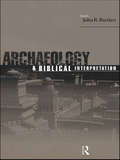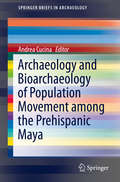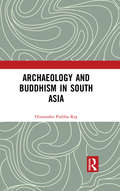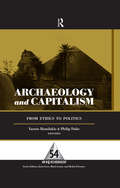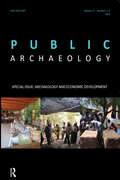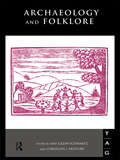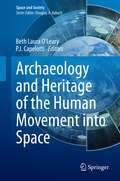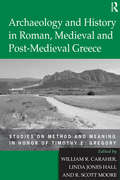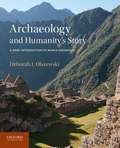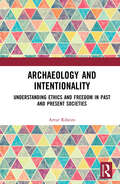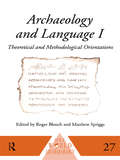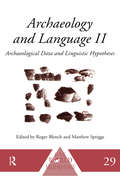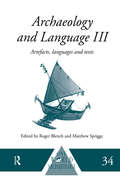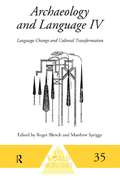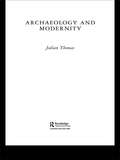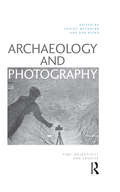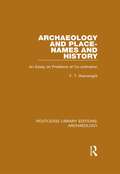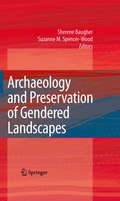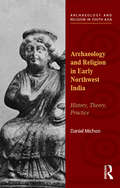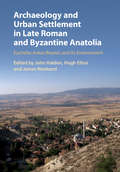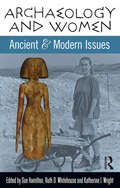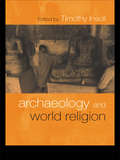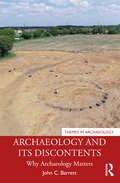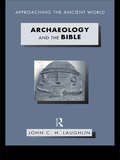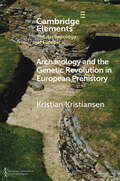- Table View
- List View
Archaeology and Biblical Interpretation
by John R. BartlettThe contributors in this book use the most recent research in key areas - the early settlements of Israel, early Israelite religion, Qumran, Jerusalem, early Christian churches - to show that ancient writings and modern archaeology can illuminate each other, but only when used with professional care. The essays represent a new generation of archaeologists and historians, with new social, political and religious concerns who draw a fresh and vital picture of the emergence of ancient Israel.
Archaeology and Bioarchaeology of Population Movement among the Prehispanic Maya (SpringerBriefs in Archaeology #4)
by Andrea CucinaArchaeological evidence - i. e. presence of exogenous, foreign material objects (pottery, obsidian and so on) - is used to make inferences on ancient trade, while population movement can only be assessed when the biological component of an ancient community is analyzed (i. e. the human skeletal remains). But the exchange of goods or the presence of foreign architectural patterns does not necessarily imply genetic admixture between groups, while at the same time humans can migrate for reasons that may not be related only to trading. The Prehispanic Maya were a complex, highly stratified society. During the Classic period, city-states governed over large regions, establishing complex ties of alliance and commerce with the region's minor centers and their allies, against other city-states within and outside the Maya realm. The fall of the political system during the Classic period (the Maya collapse) led to hypothetical invasions of leading groups from the Gulf of Mexico into the northern Maya lowland at the onset of the Postclassic. However, it is still unclear whether this collapse was already underway when this movement of people started. The whole picture of population dynamics in Maya Prehispanic times, during the Classic and the Postclassic, can slowly emerge only when all the pieces of the puzzle are put together in a holistic and multidisciplinary fashion. The contributions of this volume bring together contributions from archaeology, archaeometry, paleodemography and bioarchaeology. They provide an initial account of the dynamic qualities behind large-scale ancient population dynamics, and at the same time represent novel multidisciplinary points of departure towards an integrated reconstruction and understanding of Prehispanic population dynamics in the Maya region.
Archaeology and Buddhism in South Asia: An Archaeology Of Museum Collections (Archaeology And Religion In South Asia Ser.)
by Himanshu Prabha RayThis book traces the archaeological trajectory of the expansion of Buddhism and its regional variations in South Asia. Focusing on the multireligious context of the subcontinent in the first millennium BCE, the volume breaks from conventional studies that pose Buddhism as a counter to the Vedic tradition to understanding the religion more integrally in terms of dhamma (teachings of the Buddha), dāna (practice of cultivating generosity) and the engagement with the written word. The work underlines that relic and image worship were important features in the spread of Buddhism in the region and were instrumental in bringing the monastics and the laity together. Further, the author examines the significance of the histories of monastic complexes (viharas, stupas, caityas) and also religious travel and pilgrimage that provided connections across the subcontinent and the seas. An interdisciplinary study, this book will be of great interest to students and scholars in South Asian studies, religion, especially Buddhist studies, history and archaeology.
Archaeology and Capitalism: From Ethics to Politics (One World Archaeology Ser. #54)
by Yannis Hamilakis Philip DukeThe editors and contributors to this volume focus on the inherent political nature of archaeology and its impact on the practice of the discipline. Pointing to the discipline’s history of advancing imperialist, colonialist, and racist objectives, they insist that archaeology must rethink its muted professional stance and become more overtly active agents of change. The discipline is not about an abstract “archaeological record” but about living individuals and communities, whose lives and heritage suffer from the abuse of power relationships with states and their agents. Only by recognizing this power disparity, and adopting a political ethic for the discipline, can archaeology justify its activities. Chapters range from a critique of traditional ethical codes, to examinations of the capitalist motivations and structures within the discipline, to calls for an engaged, emancipatory archaeology that improves the lives of the people with whom archaeologists work. A direct challenge to the discipline, this volume will provoke discussion, disagreement, and inspiration for many in the field.
Archaeology and Economic Development
by Paul Burtenshaw"Nowhere in archaeology is the gap between theory and practice more evident than in its ambivalent engagement with economic development. This groundbreaking volume assembles practicing archaeologists, economists, and NGO officials in an extensive exploration of the theoretical, practical and ethical issues raised by archaeologists' use of cultural heritage to support economic development. The first chapters consider the problem of articulating the value of tangible and intangible heritage when economic measures alone are inadequate. Subsequent chapters present regional perspectives on archaeology and development, and present a host of case studies from around the globe that describe archaeologists' development projects, including some that are successful and others that are less so. These studies both suggest best practices in the implementation of development projects and illuminate the obstacles to success created by political conflict and competing human needs. Ethical issues and practical considerations converge in chapters that explore the role that members of local communities should play in the design, management and governance of archaeological and heritage resources. In this volume, archaeologists and heritage professionals will encounter a thought-provoking international discourse concerning the path forward for archaeology as the field engages with economic development."
Archaeology and Folklore (Theoretical Archaeology Group Ser.)
by Cornelius Holtorf Amy Gazin-SchwartzArchaeology and Folklore explores the complex relationship between the two disciplines to demonstrate what they might learn from each other.This collection includes theoretical discussions and case studies drawn from Western Europe, the Mediterranean and North. They explore the differences between popular traditions relating to historic sites and archaeological interpretations of their history and meaning.
Archaeology and Heritage of the Human Movement into Space (Space and Society)
by Beth Laura O'Leary P. J. CapelottiThis volume addresses the creation, documentation, preservation, and study of the archaeology of lunar, planetary, and interstellar exploration. It defines the attributes of common human technological expressions within national and, increasingly, private exploration efforts, and explore the archaeology of both fixed and mobile artifacts in the solar system and the wider galaxy. This book presents the research of the foremost scholars in the field of space archaeology and heritage, a recent discipline of the field of Space Archaeology and Heritage. It provides the emerging archaeological perspective on the history of the human exploration of space. Since humans have been creating a vast archaeological preserve in space and on other celestial bodies. This assemblage of heritage objects and sites attest to the human presence off the Earth and the study of these material remains are best investigated by archaeologists and historic preservationists. As space exploration has reached the half century mark, it is the appropriate time to reflect on the major events and technological development of this particular unique 20th century arena of human history. The authors encapsulate various ways of looking at the archaeology of both fixed and mobile human artifacts in the solar system. As missions continue into space, and as private ventures gear up for public and tourist visits to space and to the Moon and even Mars, it is the appropriate time to address questions about the meaning and significance of this material culture.
Archaeology and History in Roman, Medieval and Post-Medieval Greece: Studies on Method and Meaning in Honor of Timothy E. Gregory
by Linda Jones HallThe essays in Archaeology and History in Roman, Medieval and Post-Medieval Greece honor the contributions of Timothy E. Gregory to our understanding of Greece from the Roman period to modern times. Evoking Gregory's diverse interests, the volume brings together anthropologists, art historians, archaeologists, historians, and philologists to address such contested topics as the end of Antiquity, the so-called Byzantine Dark Ages, the contours of the emerging Byzantine civilization, and identity in post-Medieval Greece. These papers demonstrate the continued vitality of both traditional and innovative approaches to the study of material culture and emphasise that historical interpretation should be the product of methodological self-awareness. In particular, this volume shows how the study of the material culture of post-Classical Greece over the last 30 years has made significant contributions to both the larger archaeological and historical discourse. The essays in this volume are organized under three headings - Archaeology and Method, the Archaeology of Identity, and the Changing Landscape - which highlight three main focuses of Gregory's research. Each essay interlaces new analyses with the contributions Gregory has made to our understanding of Medieval and Post-Medieval Greece. Read together these essays not only make a significant contribution to how we understand the post-Classical Greek world, but also to how we study the material culture of the Mediterranean world more broadly.
Archaeology and Humanity's Story: A Brief Introduction To World Prehistory
by Deborah I. OlszewskiThis student-friendly textbook introduces the archaeological past from approximately seven million years ago through later politically complex societies. Archaeology and Humanity's Story: A Brief Introduction to World Prehistory does not attempt to discuss every archaeologically important site and development in prehistory and early history. Rather, it presents key issues from earlier prehistory and then organizes the chapters on politically complex societies using a similar framework. This allows students to easily compare and contrast different geographical regions. Each of these chapters also highlights a specific case study in which similar themes are examined, such as the written word; resource networks, trade, and exchange; social life; ritual and religion; and warfare and violence. Each chapter includes several sidebar boxes, a timeline showing the chronology relevant to that chapter, and "The Big Picture," "Peopling the Past," and "Evolutionary Processes" features.
Archaeology and Intentionality: Understanding Ethics and Freedom in Past and Present Societies
by Artur RibeiroArchaeology and Intentionality explores perhaps one of the most overlooked topics in archaeology, that of intentionality. In archaeology, most explanations of human behaviour rely on intentionality, and this book fills a surprising gap in the literature. By identifying the historical trajectory of the notion of intentionality, this book reframes our understanding of what it means to act intentionally and how archaeologists provide explanations concerning past (and present) societies. In general, this book presents a strong framework for archaeological research, one that fits to current archaeological practices and research around the world. This framework considers that past actors were not unconditional free agents, who could act however they wished, nor were they absolute prisoners of the economic, biological, and environmental circumstances in which they lived. From the standpoint of intentionality, it becomes clear that human agency is not about what you can or cannot do, but about what you should do, that is to say, actions are above all ethical. In a world wealth inequality runs rampant, where humans have damaged the environment beyond recognition, and where technology advances at an alarming rate, it is important that we recognize our intentions and the ethical responsibility that accompanies those intentions. The book highlights how archaeology is the perfect discipline to understand how and from where those intentions come. Addressing several problems in archaeological theory and connecting archaeology, philosophy, and social theory, this book is for students and researchers interested in archaeological theory and how it informs practice.
Archaeology and Language I: Theoretical and Methodological Orientations (One World Archaeology #Vol. 27)
by Roger Blench Matthew SpriggsArchaeology and Language I represents groundbreaking work in synthesizing two disciplines that are now seen as interlinked: linguistics and archaeology. This volume is the first of a three-part survey of innovative results emerging from their combination. Archaeology and historical linguistics have largely pursued separate tracks until recently, although their goals can be very similar. While there is a new awareness that these disciplines can be used to complement one another, both rigorous methodological awareness and detailed case-studies are still lacking in literature. Archaeology and Language I aims to fill this lacuna. Exploring a wide range of techniques developed by specialists in each discipline, this first volume deals with broad theoretical and methodological issues and provides an indispensable background to the detail of the studies presented in volumes II and III. This collection deals with the controversial question of the origin of language, the validity of deep-level reconstruction, the sociolinguistic modelling of prehistory and the use and value of oral tradition.
Archaeology and Language II: Archaeological Data and Linguistic Hypotheses (One World Archaeology)
by Roger Blench Matthew SpriggsUsing language to date the origin and spread of food production, Archaeology and Language II represents groundbreaking work in synthesizing two disciplines that are now seen as interlinked: linguistics and archaeology. This volume is the second part of a three-part survey of innovative results emerging from their combination. Archaeology and historical linguistics have largely pursued separate tracks until recently, although their goals can be very similar. While there is a new awareness that these disciplines can be used to complement one another, both rigorous methodological awareness and detailed case-studies are still lacking in the literature. This three-part survey is the first study to address this. Archaeology and Language II examines in some detail how archaeological data can be interpreted through linguistic hypotheses. This collection demonstrates the possibility that, where archaeological sequences are reasonably well-known, they might be tied into evidence of language diversification and thus produce absolute chronologies. Where there is evidence for migrations and expansions these can be explored through both disciplines to produce a richer interpretation of prehistory. An important part of this is the origin and spread of food production which can be modelled through the spread of both plants and words for them. Archaeology and Language II will be of interest to researchers in linguistics, archaeologists and anthropologists.
Archaeology and Language III: Artefacts, Languages and Texts (One World Archaeology)
by Roger Blench Matthew SpriggsArchaeology and Language III interprets results from archaeological data in terms of language distribution and change, providing the tools for a radical rewriting of the conventional discourse of prehistory. Individual chapters present case studies of artefacts and fragmentary textual materials, concerned with the reconstruction of houses, maritime technology, pottery and grave goods.
Archaeology and Language IV: Language Change and Cultural Transformation (One World Archaeology #Vol. 35)
by Roger Blench Matthew SpriggsArchaeology and Language IV examines a variety of pressing issues regarding linguistic and cultural change. It provides a challenging variety of case-studies which demonstrate how global patterns of language distribution and change can be interwoven to produce a rich historical narrative, and fuel a radical rethinking of the conventional discourse of linguistics within archaeology.
Archaeology and Modernity
by Julian ThomasThis is the first book-length study to explore the relationship between archaeology and modern thought, showing how philosophical ideas that developed in the seventeenth to nineteenth centuries still dominate our approach to the material remains of ancient societies. Addressing current debates from a new viewpoint, Archaeology and Modernity discusses the modern emphasis on method rather than ethics or meaning, our understanding of change in history and nature, the role of the nation-state in forming our views of the past, and contemporary notions of human individuality, the mind, and materiality.
Archaeology and Photography: Time, Objectivity and Archive
by Lesley McFADYENDoes a photograph freeze a moment of time? What does it mean to treat a photographic image as an artefact? In the visual culture of the 21st century, do new digital and social forms change the status of photography as archival or objective – or are they revealing something more fundamental about photography’s longstanding relationships with time and knowledge?Archaeology and Photography imagines a new kind of Visual Archaeology that tackles these questions. The book reassesses the central place of Photography as an archaeological method, and re-wires our cross-disciplinary conceptions of time, objectivity and archives, from the History of Art to the History of Science.Through twelve new wide-ranging and challenging studies from an emerging generation of archaeological thinkers, Archaeology and Photography introduces new approaches to historical photographs in museums and to contemporaryphotographic practice in the field. The book re-frames the relationship between Photography and Archaeology, past and present, as more than a metaphor or an analogy – but a shared vision.Archaeology and Photography calls for a change in how we think about photography and time. It argues that new archaeological accounts of duration and presence can replace older conceptions of the photograph as a snapshot orremnant received in the present. The book challenges us to imagine Photography, like Archaeology, not as a representation of the past and the reception of traces in the present but as an ongoing transformation of objectivity and archive.Archaeology and Photography will prove indispensable to students, researchers and practitioners in History, Photography, Art, Archaeology, Anthropology, Science and Technology Studies and Museum and Heritage Studies.
Archaeology and Place-Names and History: An Essay on Problems of Co-ordination (Routledge Library Editions: Archaeology)
by F.T. WainwrightIn the period A.D. 400-1100, perhaps more than in any other, it is necessary to bring together the results of historical, archaeological and place-name studies. Each provides information that is either badly preserved or not preserved at all in the other two, but it is not always realised how great are the difficulties involves in co-ordination and integration. This book, originally published in 1962, draws attention to the problems and provides a basis for discussion.
Archaeology and Preservation of Gendered Landscapes
by Suzanne M. Spencer-Wood Sherene BaugherHistorical archaeology of landscapes initially followed the pattern of Classical Archaeology by studying elite men's gardens. Over time, particularly in North America, the field has expanded to cover larger settlement areas, but still often with ungendered and elite focus. The editors of this volume seek to fill this important gap in the literature by presenting studies of gendered power dynamics and their effect on minority groups in North America. Case studies presented include communities of Native Americans, African Americans, multi-ethnic groups, religious communities, and industrial communities. Just as the research focus has previously neglected the groups presented here, so too has funding to preserve important archaeological sites. As the contributors to this important volume present a new framework for understanding the archaeology of religious and social minority groups, they also demonstrate the importance of preserving the cultural landscapes, particularly of minority groups, from destruction by the modern dominant culture. A full and complete picture of cultural preservation has to include all of the groups that interacted form it.
Archaeology and Religion in Early Northwest India: History, Theory, Practice (Archaeology and Religion in South Asia)
by Daniel MichonThis book explores the ways in which past cultures have been used to shape colonial and postcolonial cultural identities. It provides a theoretical framework to understand these processes, and offers illustrative case studies in which the agency of ancient peoples, rather than the desires of antiquarians and archaeologists, is brought to the fore.
Archaeology and Urban Settlement in Late Roman and Byzantine Anatolia: Euchaïa-Avkat-Beyözü and its Environment
by John Haldon Hugh Elton James NewhardThe site of medieval Euchaïta, on the northern edge of the central Anatolian plateau, was the centre of the cult of St Theodore Tiro ('the Recruit'). Unlike most excavated or surveyed urban centres of the Byzantine period, Euchaïta was never a major metropolis, cultural centre or extensive urban site, although it had a military function from the seventh to ninth centuries. Its significance lies precisely in the fact that as a small provincial town, something of a backwater, it was probably more typical of the 'average' provincial Anatolian urban settlement, yet almost nothing is known about such sites. This volume represents the results of a collaborative project that integrates archaeological survey work with other disciplines in a unified approach to the region both to enhance understanding of the history of Byzantine provincial society and to illustrate the application of innovative approaches to field survey.
Archaeology and Women: Ancient and Modern Issues (UCL Institute of Archaeology Publications)
by Sue Hamilton Ruth D Whitehouse Katherine I WrightArchaeology and Women draws together from a variety of angles work currently being done within a contemporary framework on women in archaeology. One section of this collection of original articles addresses the historical and contemporary roles of women in the discipline. Another attempts to link contemporary archaeological theory and practice to work on women and gender in other fields. Finally, this volume presents a wide diversity of theoretical approaches and methods of study of women in the ancient world, representing a cross section of work being carried out today under the broad banner of gender archaeology. The geographical and chronological range of the contributions is also wide, from Southeast Asia and South America to Western Asia, Egypt and Europe, from Great Britain to Greece, and from 10,000 years ago to the recent past. An ideal sampler for courses dealing with women and archaeology.
Archaeology and World Religion: The Proceedings Of The Cambridge Conference (British Archaeological Reports International Ser.)
by Timothy InsollArchaeology and World Religion is an important new work, being the first to examine these two vast topics together. The volume explores the relationship between, and the contribution archaeology can make to the study of 'World Religions'.The contributors consider a number of questions:* can religious (sacred) texts be treated as historical documents, or do they merit special treatment? * Does archaeology with its emphasis on material culture dispel notions of the ideal/divine? * Does the study of archaeology and religion lead to differing interpretations of the same event?* In what ways does the notion of a uniform religious identity exist and is this recognisable in the archaeological record?Clearly written and up-to-date, this volume will be an indispensable research tool for academics and specialists in these fields.
Archaeology and its Discontents: Why Archaeology Matters (Themes in Archaeology Series)
by John C. BarrettArchaeology and its Discontents examines the state of archaeology today and its development throughout the twentieth century, making a powerful case for new approaches. Surveying the themes of twentieth-century archaeological theory, Barrett looks at their successes, limitations, and failures. Seeing more failures and limitations than successes, he argues that archaeology has over-focused on explaining the human construction of material variability and should instead be more concerned with understanding how human diversity has been constructed. Archaeology matters, he argues, precisely because of the insights it can offer into the development of human diversity. The analysis and argument are illustrated throughout by reference to the development of the European Neolithic. Arguing both for new approaches and for the importance of archaeology as a discipline, Archaeology and its Discontents is for archaeologists at all levels, from student to professor and trainee to experienced practitioner.
Archaeology and the Bible (Approaching the Ancient World)
by John LaughlinThis book challenges readers to consider whether archaeology explains the Bible.Archaeology and the Bible examines new developments in archaeological finds in the Near East, particularly Palestine, that are related to the Bible. New methodologies, regional surveys and creative syntheses have all had an impact on traditional approaches to looking at these discoveries. John Laughlin examines these new developments and discusses what they imply for biblical studies.
Archaeology and the Genetic Revolution in European Prehistory (Elements in the Archaeology of Europe)
by Kristian KristiansenThis Element was written to meet the theoretical and methodological challenge raised by the third science revolution and its implications for how to study and interpret European prehistory. The first section is therefore devoted to a historical and theoretical discussion of how to practice interdisciplinarity in this new age, and following from that, how to define some crucial, but undertheorized categories, such as culture, ethnicity and various forms of migration. The author thus integrates the new results from archaeogenetics into an archaeological frame of reference, to produce a new and theoretically informed historical narrative, one that also invites debate, but also one that identifies areas of uncertainty, where more research is needed.
